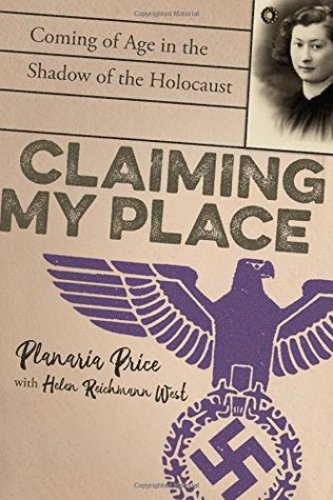
Claiming My Place
A True Story of Defiance, Deception, and Coming of Age in the Shadow of the Holocaust
فرمت کتاب
ebook
تاریخ انتشار
2018
Lexile Score
970
Reading Level
5-7
ATOS
6.8
Interest Level
6-12(MG+)
نویسنده
Helen Reichmann Westشابک
9780374305307
کتاب های مرتبط
- اطلاعات
- نقد و بررسی
- دیدگاه کاربران
نقد و بررسی

January 22, 2018
Price’s rendering of West’s mother’s early life reads like suspenseful historical fiction, telling a rarely heard side of the Jewish experience during WWII. Barbara Reichmann, born Sura Gitla “Gucia” Gomolinska in 1916, described to Rice, in sensory detail, her prewar Jewish childhood in a town in central Poland, followed by the tense war years living in Poland, Germany, and Switzerland as a Polish-Catholic girl named Basia. Reichman’s education, fluency in Polish, and fair hair and coloring allowed her to pass as a non-Jew while many of her friends and family suffered through or died during the Holocaust. Writing from an engrossing first-person perspective, Price makes Gucia/Basia a fully dimensional character, tracing her development from taking her heritage and faith for granted to becoming a leader in the youth Zionist movement at age 13. She left the organization at 18, realized that she might survive the war by hiding her identity. Family, friendships, and romance give poignancy to this unique coming-of-age story, which is further enhanced by maps, photos, a glossary, and an afterword. Ages 12–up.

February 15, 2018
The true story of a Jewish teenager who survived the Holocaust by passing as a Christian Pole.Gucia Gomolinska was raised in a loving family in a Jewish neighborhood of Piotrkow Trybunalski, in central Poland. When the Nazis came, blonde Gucia, then in her 20s, was able to escape the ghetto before its liquidation by changing her name to Barbara and obtaining false papers identifying her as Polish. Post-war, she reunited with the few miraculously surviving members of her family, married, and had a daughter. Upon realizing that they couldn't return to Poland--surviving Polish Jews were sometimes massacred in pogroms--the young family settled in the United States with help from the Hebrew Immigrant Aid Society. Told in the first person, this biography was based on interviews with both Barbara and her daughter, Helen. Loving depictions of pre-war Piotrkow are filled with realistic touches that make its lost past palpable: teachers Barbara adored or disliked, interactions between the myriad youth groups, her early interest in politics, and her questions about religion. In an afterword by Helen we learn of Barbara's disgust in witnessing racial hatred in the form of segregation after her arrival in the United States.A rich exploration of a Holocaust survivor's sheltered childhood, the atrocity that failed to destroy her, and her later life as an immigrant. (photographs, afterword, glossary) (Biography. 12-15)
COPYRIGHT(2018) Kirkus Reviews, ALL RIGHTS RESERVED.

April 1, 2018
Gr 7 Up-During her childhood in Piotrków Trybunalski, Poland, Gucia Gomolinska had access to a good education, and she actively participated in a Zionist youth group. All of that changed in 1939 when Nazi Germany invaded Poland. After losing her mother to typhoid and seeing many family members, friends, and neighbors murdered by German soldiers, Gomolinska realized that her survival depended upon hiding her identity. Under the name Danuta Barbara Tanska, Basia for short, she moved away and found work in Polish and German towns that were safer because they were supposedly Judenrein, "cleansed of Jews." Told in a present tense, first-person narrative, this true story was written based on extensive interviews with Basia. The account describes how she survived the war and also tells the stories of family and friends, such as Heniek, her longtime boyfriend, and Sabina, her companion and roommate. Basia's determination and strength of character is skillfully emphasized. An episode from her early childhood hints at this for readers (she refused to wait a year to start school after her father forgot to register her). VERDICT Thanks to the detailed memories and the conversational tone, this book provides an engaging and informative reading experience with as much appeal as a fiction title. Recommended for most YA nonfiction collections.-Magdalena Teske, West Chicago Public Library District
Copyright 2018 School Library Journal, LLC Used with permission.

February 1, 2018
Grades 8-11 Holocaust stories are perennial for a reason, and the latest iteration is this account of the remarkable survival of a Polish Jew named Gucia Gomolinska. Born in a small town, she led a largely uneventful life until September 1, 1939, when she was 23 and the Germans invaded Poland. Overnight, her world was turned upside down, as her family became exposed to rabid anti-Semitism. It soon became obvious to Gucia that inaction would mean death, so she changed her name to Danuta Barbara (Basia) Tanska and, thanks to her ash-blonde hair and fair complexion, was able to assume a new life as a Polish Gentile, actually traveling to Germany, where she found work as a chambermaid, hiding from the authorities in plain sight. The fascinating story continues to Basia's marriage and emigration to the U.S. after the war. Price has boldly elected to tell the story in Basia's own first-person, present-tense voice. The result is a dramatic, suspenseful account of survival in extremis, told in collaboration with Basia's American daughter.(Reprinted with permission of Booklist, copyright 2018, American Library Association.)

aj231561 - Very sad but action packed.

























دیدگاه کاربران